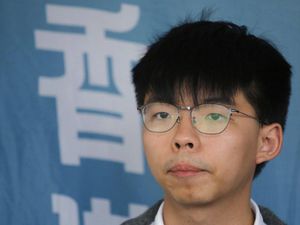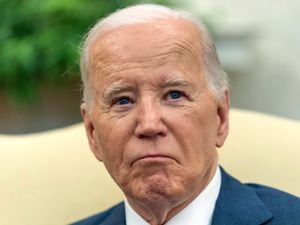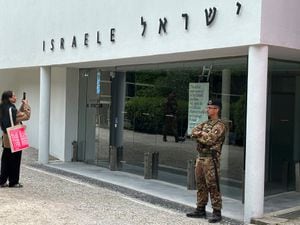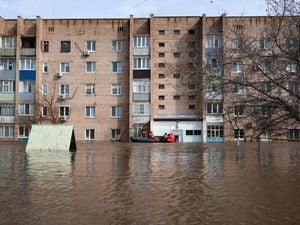Umbrella Movement leader joins Hong Kong protests after jail release
Organisers said two million people joined a march calling for the territory’s chief executive to quit after she postponed extradition legislation.

A leader of Hong Kong’s 2014 Umbrella Movement has joined protesters gathered near government headquarters after he was released from prison.
Joshua Wong was freed as demonstrators continued to call for the former British territory’s chief executive Carrie Lam to step down amid mass protests over a controversial extradition bill.
The legislation would have allowed Hong Kong suspects to be extradited to mainland China.
Ms Lam announced on Saturday that the bill would be postponed indefinitely, but protesters are continuing to call for it to be completely withdrawn amid fears that it threatens Hong Kong’s freedoms and legal autonomy under its special status since Beijing regained control in 1997.
After speaking to journalists who mobbed him as he left prison, Mr Wong laid flowers at a makeshift memorial outside a shopping mall where a protester fell to his death on Saturday night.
He said in a tweet: “Hello world and hello freedom. GO HONG KONG!! Withdraw the extradition bill. Carrie Lam step down. Drop all political persecutions.”

Mr Wong served half of a two-month sentence for contempt related to his involvement in the 2014 protests, which had called for a more democratic election process in the Hong Kong legislature.
Organisers said Sunday’s march drew nearly two million people in a city with a population of seven million, although police cited a much lower figure.
Protesters have now largely left the streets, with remaining demonstrators moving to areas close to Hong Kong’s government headquarters.

The activists have rejected an apology from Ms Lam for her handling of the legislation.
Lee Cheuk-yan, a former legislator and activist, said: “We are very angry that Carrie Lam has not responded to the demands of all the protesters.”
He added that demonstrators must now focus on making the issue a “long-term struggle, and not a day struggle”. He said that if Ms Lam does not respond to protesters’ demands, “people will come back and the struggle will continue”.

Police said 338,000 people were counted on the designated protest route in the “peak period” of the march on Sunday.
A week earlier, as many as one million people demonstrated to voice their concern over Hong Kong’s relations with mainland China in one of the toughest tests of the territory’s special status since Beijing took control from the UK in 1997.
The scenes were similar to those seen nearly five years earlier, when protesters as part of the Umbrella Movement camped for weeks in the streets to protest against rules that prevented the direct election of the city’s chief executive.

Hong Kong residents and human rights campaigners worry that allowing some suspects to be extradited to mainland China would mean they could potentially face vague political charges, as well as unfair trials and possible torture.
The protesters are calling for Ms Lam to scrap the proposal for good and step down.
Protesters are also angered over the forceful tactics employed by police, including the use of tear gas, rubber bullets and other measures, as demonstrators broke through barricades outside the city government’s headquarters on Wednesday.
They have also voiced concern over Ms Lam’s decision to call the clashes a riot. Doing so worsens the potential legal consequences for those involved.
In a statement issued late on Sunday, Ms Lam noted the demonstrations and said the government “understands that these views have been made out of love and care for Hong Kong”.
It added: “The chief executive apologises to the people of Hong Kong for this and pledges to adopt a most sincere and humble attitude to accept criticisms and make improvements in serving the public.”





